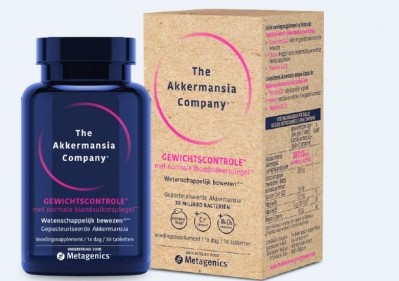Akkermansia’s immune benefits linked to specific phospholipid

Akkermansia muciniphila has attracted growing interest for its health-promoting effects. In rodents, treatment with A. muciniphila reduces obesity and related disorders, such as glucose intolerance, insulin resistance and gut permeability.
The species Akkermansia muciniphila reportedly has an abundance of about 3% in the human colon, and its abundance in the intestinal mucus layer is inversely correlated with BMI, type 1 diabetes, and bowel disease in humans. Akkermansia is known to produce nutrients that feed intestinal cells responsible for producing the intestinal mucus layer, helping to maintain healthy intestinal barrier function, control gut permeability, and control low grade inflammation in the gut.
Much of the research into the species has been conducted in Belgium at the Catholic University of Louvain, and a spin-off company called A-Mansia was launched several years ago focusing on commercial development of A. muciniphila products.
Immune benefits
A new study published in Nature deepens our understanding of the bacterium, reporting that the potential immunomodulatory activity of Akkermansia.
Scientists from of Harvard Medical School and the Broad Institute of MIT looked for immunogens (molecules that cause an immune response) within A. muciniphila by testing different compounds produced from the bacteria to see if they could cause the release of cytokines (molecules that regulate the immune system).
A lipid fraction from a small initial culture was found to induce the cytokine tumor necrosis factor alpha (TNF-alpha).
Additional experimentation using bacterial cultures and analytical fractions led to the isolation of a specific type of phosphatidylethanolamine (PE). PEs are the most abundant phospholipids in the membranes of most bacteria. The active constituent was found to be a diacyl PE with two branched chains (a15:0-i15:0 PE).
The researchers noted that this PE accounts for about 50% of A. muciniphila’s lipid membrane. It triggers the release of some inflammatory cytokines, such as TNF-alpha, but not others, they reported.
Further investigation showed that the unique immune signaling modulation by the lipid depends on a pair of two immune receptors that recognize and respond to microbial infection. Low-level stimulation of the signaling pathway by this lipid can help reestablish the immune system to its normal state and maintain immune homeostasis.
“Although there is still much to be learned about the pharmacology of a15:0-i15:0 PE, the existing data support a model in which repeated low-level stimulation of the TLR2–TLR1 signalling pathway resets the activation threshold so that weak signals are ignored and strong signals are moderated, thereby contributing to homeostatic immunity,” wrote the researchers.
“It is also important to note that the data underlying the model are from in vitro studies and in vivo studies will be needed to fully validate it,” they added.
The study was funded by the National Center for Complementary and Integrative Health at the US National Institutes of Health and the Linde Family Programme in Cancer Chemical Biology.
Source: Nature
2022; Volume 608, Number 7921, Pages 168-173. Doi: 10.1038/s41586-022-04985-7
“Akkermansia muciniphila phospholipid induces homeostatic immune responses”
Authors: M. Bae
















